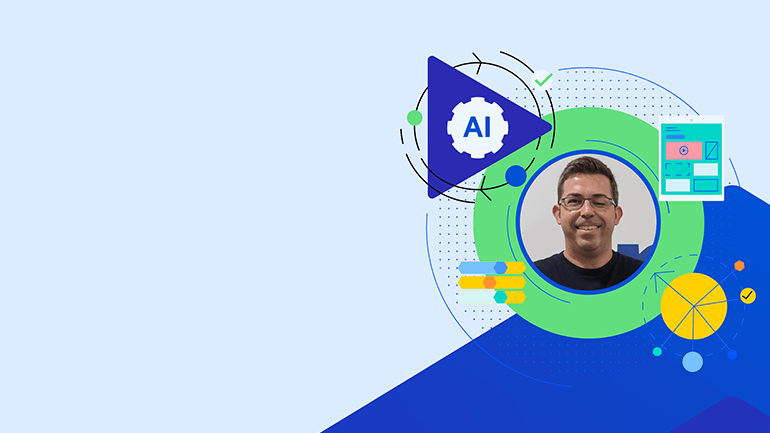This Innovative Developer’s Award-Winning Hackathon Journey Is Bringing AI and OpenEdge Together

Back in September, the OpenEdge AI Hackathon took center stage at the Leeds Digital Festival, and what unfolded was truly inspiring. The event highlighted the incredible potential of combining the Progress OpenEdge platform with AI innovation. Participants delivered a range of creative, real-world applications that showcased just how powerful and practical AI can be when built on OpenEdge. I had the privilege of sitting down with the winning participant, Carlos Vega, to learn more about his experience and the award-winning idea that captured everyone’s attention.
The OpenEdge AI Hackathon: A New Challenge
Carlos is a veteran backend developer based in Barcelona, Spain, with 20 years of experience specializing in Progress OpenEdge solutions. “I’m a software developer of ERP products and we have 20 years of experience with Progress OpenEdge. The last five years I have been focused on APIs development,” Carlos shares.
Though Carlos has long worked with APIs and backend architecture, building AI solutions was a new frontier. As he recalls, “Before that I didn’t have much background with AI. At the end of 2024, I started to research how I could use an MCP server.”
Carlos’s intrigue with the Model Context Protocol (MCP) grew when he saw an opportunity to connect OpenEdge with AI models via a standardized protocol. “I was excited with the idea of a universal protocol to interact with AI.”
After weeks of research and trial, Carlos succeeded in building an MCP server: “With many weeks or interactions and looking [at] the website that it’s very well explained… I have success with an MCP server in Java.”
When Carlos saw the announcement for the OpenEdge AI hackathon at the Leeds Digital Festival, he was ready to take his research further: “I start to think that this is a good opportunity to try to do the same with Advanced Business Language (ABL).”
The Project: Natural Language Data Queries in Progress
Carlos’s winning hackathon entry showcased a powerful use case—integrating natural-language queries directly with an OpenEdge database, all built in ABL. Instead of writing traditional ABL queries, users can simply “talk” to an AI-driven agent that retrieves data from the Sports2020 database in conversational form.
Carlos built an MCP server using ABL that communicates with the OpenEdge backend through Progress Application Server (PAS) for OpenEdge. The server interacts with multiple API endpoints hosted on PAS for OE, each performing specific actions on the Sports2020 database—such as fetching customer data, listing orders and ranking clients. Every API endpoint is registered as a tool within the MCP server, enabling seamless integration.
To deliver a natural-language experience, Carlos also developed an MCP client using n8n, equipped with memory capabilities for conversational context. This client translates user queries into API calls via the MCP server, retrieves structured results and presents them in a chat-like interface. Users can search for customers, check orders, rank clients, and more, all through simple, intuitive language.
Carlos emphasizes that his MCP server was built entirely in ABL, rather than common alternatives like Python, TypeScript/JavaScript (Node.js), Java and C#:
“In OpenEdge, we don’t have officially one way to do an MCP server, but basically it’s a special API with universal rules to do interactions between your data or business logic and an AI model.”
He used the Sports2020 database as a template for developers:
“For me, these are good examples for the community. To understand that it is possible to adapt or to start steps with a lot of products that exist in OpenEdge to interact with AI,” Carlos explains.
Architecture Summary
- MCP Server (ABL-based): Acts as the bridge between AI clients and the OpenEdge backend. It registers available API endpoints as MCP tools.
- PAS for OpenEdge Backend: Hosts APIs that perform actions on the Sports2020 database (e.g., fetching customer data, listing orders, ranking clients).
- Sport2020 Database: OpenEdge RDBMS containing customer, order and business data used for real-time queries.
- MCP Client (n8n): A workflow automation tool configured as an MCP client, with memory capabilities for conversational context and natural-language querying.
- AI Interaction Layer: Users query the OpenEdge database in natural language. The MCP client translates queries into API calls via the MCP server, retrieves structured results, and presents them in a chat-like interface.
Technical Highlights of Carlos’s Solution
Carlos’s Sports 2020 MCP server was designed and built from scratch, with the following distinguishing features:
- No SDK or framework: developed directly atop OpenEdge capabilities
- Implements JSON-RPC 2.0 API protocols for standard interactions
- Built with Streamable HTTP, allowing modern integration and extensibility
- Modular architecture for easy feature expansion
- Secure, with built-in authentication and authorization support
This solution enables real-time interaction with OpenEdge data via natural-language queries, allowing users to “talk” to the database—finding customers, generating invoices, and performing business logic actions entirely through conversational AI.
It also introduces a modular architecture using PAS for OpenEdge APIs as MCP tools, a reusable design for other OpenEdge applications, and demonstrates practical MCP integration using ABL and n8n. Furthermore, the AI Agent can be integrated with web and GUI clients, including legacy systems, opening new possibilities for enterprise application interfaces and modernization.
Community Impact and Why It Matters
MCP servers are generally developed in Java, C#, or Node JS, but Carlos built his MCP server in ABL, which makes his project unique. He can interact with this agent in a GUI or web interface, even using legacy technology or clients.
Carlos sees his achievement not just as a personal win but as proof of what’s possible with creativity in the OpenEdge community: “For me to share the message that it’s possible to do something modern with ABL, for me, this is the most grateful part. It’s possible to do something complex with basic blocks and you create a castle. My best pride is to share that it’s possible.”
Carlos’s project stands as inspiration: new things are possible, and with ABL being a human-readable coding language perfect for large language models, the OpenEdge platform offers organizations the ability to innovate and deliver valuable human-centric AI workflows and applications. By integrating with Agentic RAG systems for contextual data retrieval and offering this model as a proof of concept for OpenEdge modernization initiatives, organizations can accelerate transformation while leveraging AI-driven insights.
Ready to Explore More?
Carlos shared his full project details and code with the community so others could learn and build on his work.
Check out the implementation and join the conversation here.
Discover What’s Possible with Progress OpenEdge
Want to learn more about how OpenEdge can help you modernize, innovate and integrate AI into your applications?

Jessica (Malakian) Newton
Jessica (Malakian) Newton is a Senior Product Marketing Specialist at Progress, focused on the Progress OpenEdge product. Jessica started her career at Progress as an intern in 2020 and has since developed into a full-time marketer, dedicated to guiding customers on how to maximize the value of their OpenEdge solutions. Outside of work, Jessica enjoys reading and writing.
